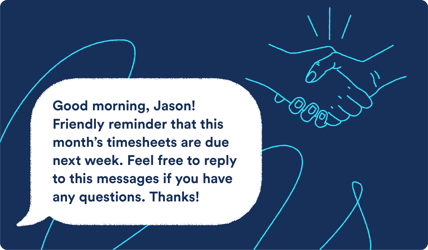
Texting has become the primary form of personal communication for most people. When an immediate response is required or an urgent message must be delivered, texting can't be beaten for its convenience, speed, and efficiency.
In business, text messaging is increasingly common, and for many of the same reasons. However, as with all business communication, it is critical to get it right.
Nine Top Tips for Successful Business Texting
If you are new to business texting, we've put together a few tips to get you started. With a little preparation, you will be engaging your teams and texting customers and prospects like never before.
The timing, wording, and tone of your text messages should always be professional, as they speak your brand's voice.
Here are nine best practices to use when texting for your business:
1. Pay attention to your timing. Messages sent after-hours are considered urgent, so sending a billing or appointment reminder, or anything that could be handled during business hours is not a good idea.
2. Keep it brief. The purpose of texting is to communicate short messages quickly, so don't make it complicated or in-depth. Get your message across as succinctly and rapidly as possible. Try to stick to one topic per message.
3. Mind your tone. The use of texting in all caps to grab attention, to convey importance or urgency, or emphasize a thought is a common stylistic usage in the internet age. However, it can also convey an aggressive tone.
4. Do not text confidential or sensitive information. Texting is less private than talking on the telephone or in person. Words live on forever, so if you have something particularly personal to talk about, it's probably best done on another channel.
5. Avoid abbreviations and emojis. Make your messages short and to the point, but resist the urge to abbreviate words and phrases, and avoid acronyms if you can. While it might sometimes be appropriate to shorten a common word or phrase, it doesn't always look professional. A good rule of thumb is never to abbreviate anything you would not feel comfortable spelling out. It's better to type out the entire word or phrase to be on the safe side.
6. Spelling and punctuation count. Edit and proof your text messages before you send them. Make sure all words are spelled correctly so that you don't confuse what you're trying to say. If you frequently send similar messages, think about using templates to minimize errors
7. Text clear, specific information. Get to the point right away. Present the most important ideas right up-front to be sure your text message is received, loud and clear.
8. State who you are. If the contact doesn't know who you are, they might ignore your message, especially if it is coming from a number they don't recognize.
9. Respond promptly. Be prepared to respond to texts immediately after you send out your broadcast. People become frustrated when they feel like communication only goes one way. If your broadcasts are pre-scheduled, be sure you have somebody standing by to send text replies.
Are you ready to get started with mass texting for your business? Call-Em-All offers several plans to support your needs. Reach out to our team to learn more or sign up for a free trial today.











